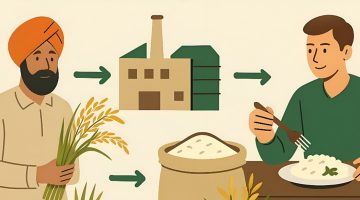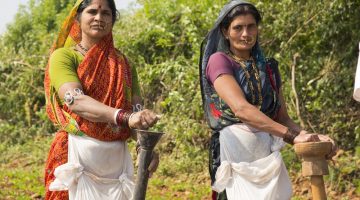Indian Agriculture Growth and Crop Protection Industry
The importance of pesticides for agriculture is enormous because they are considered as one of the major tools to protect crops and increase the yield. Today, the crop protection products sector is a fast developing industry, which is open to innovation. The pesticides market is also propelled by factors like growing population, and the need for minimizing crop damage. The opportunity lies in developing and executing innovative farming solutions that address the needs of the Indian farmer with very low landholding size, resources and knowhow available to him. India has to ensure food security for population of 1.21 billion while facing reduction in cultivable land resource. With increasing population, demand for food grains is increasing at a faster pace as compared to its production. This necessitates the use of pesticides or crop protection chemicals in a judicious manner within the confines of a regulatory framework of the country.
Parliamentary Standing Committee report
In response to a query from the Parliamentary Standing Committee (2012-2013) on the extent to which agriculture production has increased with the use of pesticides, the Department of Chemicals and Petrochemicals in its written reply stated that
[su_quote]Every year in India, pests and diseases eat away, on an average, 20-30% of food, worth about Rs. 45000 crore, produced by the farmers. World over, the damage by fungi to rice, wheat and maize alone costs $60 billion per year and the Fungal diseases destroy 125 million tonnes of rice, wheat, maize, potatoes and soyabeans each year. Stemming fungal diseases alone in the world’s five most important crops could feed more than 600 million people. It is, therefore, essential to control the pests and diseases through Primary Plant Protection for providing sufficient food security to the growing population of the country. (Source: Agriculture Today: The National Agriculture Magazine, July 2012). “Green Revolution” during the 1960s and 1970s, has considerably increased the crop production and made India self-sufficient in food. It is mentioned that apart from high yielding seeds, chemical fertilizers, irrigation; pesticides played a very important role in enabling the Green Revolution. Availability of safe & effective pesticides and their judicious use by the farming community is critical to a sustained increase in agricultural production and productivity. Pesticides are also useful in health programmes for controlling vectors, responsible for diseases like malaria.[/su_quote]
CropLife members’ contribution to Indian Agriculture during National Emergencies
CropLife India member companies have also come to the rescue of Indian Agriculture during national crop emergencies due to infestation of pests such as Phalaris minor, Heliothis armigera, Rice BPH, Cotton White fly & CLCV by introducing innovative crop protection solutions. As on date, CropLife India members have introduced 243 molecules out of the 260 registered in India. Further, it has also enabled farmers to adopt these new crop protection technologies while improving the productivity and contributing to India’s Food Security.
Crop protection technologies have developed over the years with the advancements in R & D on chemistries that are being introduced today, which are far less toxic and the dosages have also come down dramatically over the decades. This has been possible due to Government’s facilitation and industry efforts to bring in better crop protection solutions to Indian Farmers.
Challenges faced by the Industry
The Crop protection industry in India has been facing major challenges like influx of counterfeiting of crop protection solutions, which affects food production, the health of farmers and consumers, and the overall environment. In India, spurious pesticides constitute 25 % of the pesticide market. The situation needs to be addressed to curb further proliferation. Stringent procedures are required by the customs to identify and analyse chemical compounds in the various entry points.
The other vital issues of pesticides industry such as prevention of use of spurious pesticides, quality standards, testing, review of use of pesticides, to create awareness about judicious use of pesticides among the farmer community are also looked after by the Department of Agriculture and Cooperation(DAC).
New Product development and screening of ideas in crop protection industry
The main contention in Agrochemical and Pharmaceutical industries is not only the fact that there is around 3 years lead time between a product is being applied for patent and it is actually out into the market. The lead time actually conceptualizing a product and finally selling it commercially is even more. For the last 10 years industry average, the lead time between a product being synthesized for the first time to the market is about 9.1 years.
For formulating one successful, unique product (Noble Product) of crop production, there is actually a screening of about 140,000 molecules and the whole process costs about $ 210 million from inception to consummation. So the main concern is to design a product looking ahead into a market of 10 years ahead. The R and D of an agrochemical company will have to assume the market conditions, prevailing problems and regulations 10-12 years ahead and then design a new product.
Why do Indian farmers need Crop Protection products?
Crop protection products are designed to protect crops from insects, diseases and weeds. They do so by controlling pests that infect, consume or damage crops. Uncontrolled pests significantly reduce the quantity and quality of food production. It is estimated that annual crop losses could double without the use of crop protection products. Food crops must compete with 30,000 species of weeds, 3,000 species of nematodes and 10,000 species of plant-eating insects. We know that despite the use of modern crop protection products 20-40% of potential food production is still lost every year to pests. These losses can occur while the crop is growing in the field, when it is in storage and in the home. In short, an adequate, reliable food supply cannot be guaranteed without the use of crop protection products.
While a study released by industry body Assocham and Yes Bank in February 2014 pest and disease infestation resulted in crop losses worth Rs 50,000 crore annually in India. The pesticides market will witness robust growth in the vegetables, fruits, and nuts segment. Synthetic pesticides have been extensively used in the country for alleviating the estimated 45% gross loss of crops due to infestation of pests and diseases.







